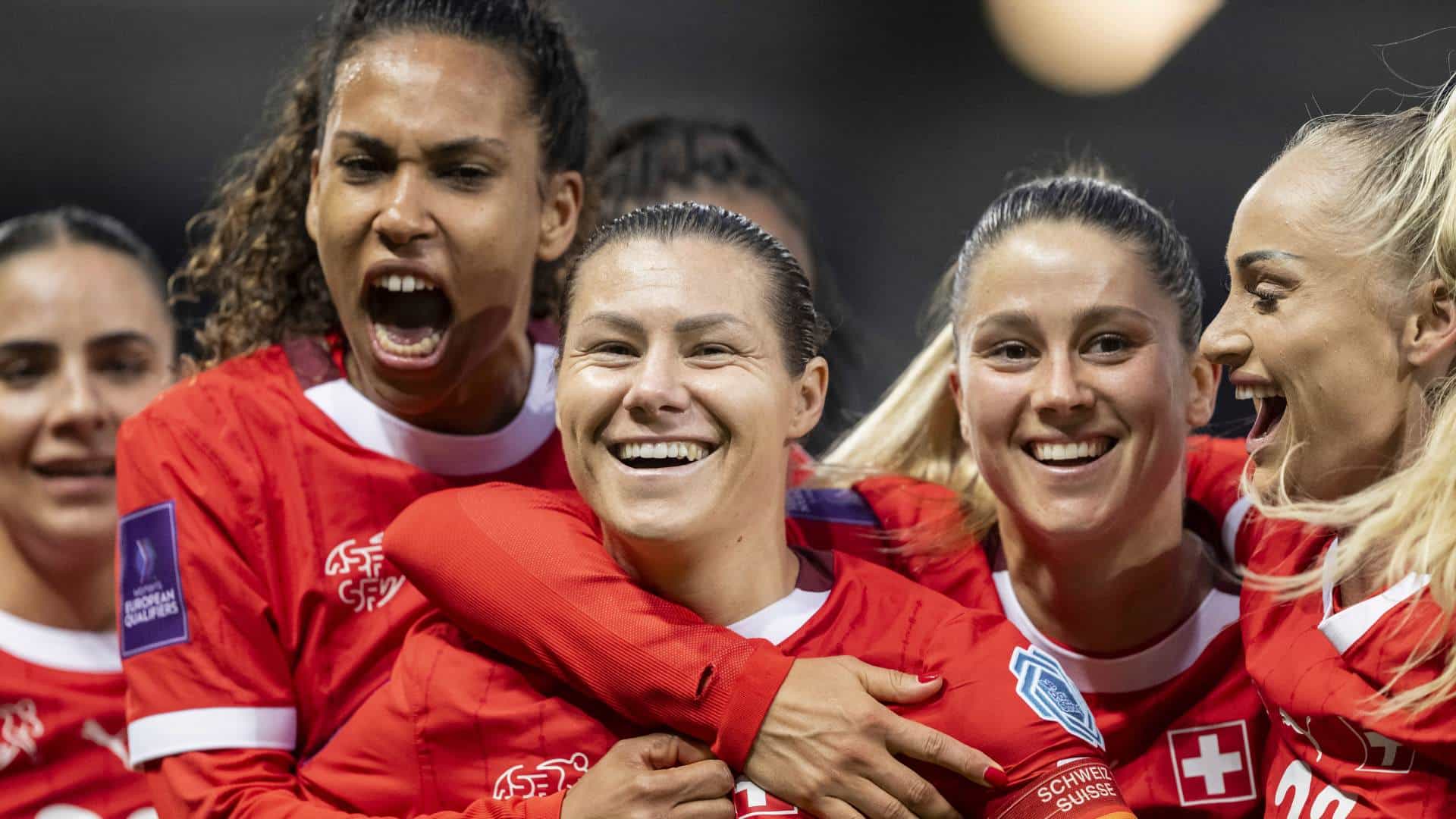Almost 16 million girls play organized football around the world. Yet most professional players have yet to earn a living wage.

Switzerland’s Ramona Bachmann, center, celebrates with teammates after scoring a goal during a Women’s Euro 2025 qualifying soccer match against Hungary in Biel, Switzerland, 31 May 2024. (Credit: Alessandro della Valle/Keystone via AP)
This article, by high school student Yi Le Low was produced out of News Decoder’s school partnership program. Yi le attends Realgymnasium Rämibühl in Zurich, Switzerland, a News Decoder partner institution. Learn more about how News Decoder can work with your school.
With the UEFA Women’s Euros coming to Switzerland in 2025, there has been much fanfare and interest generated ahead of the competition. The Swiss government, after some wrangling, is investing some 15 million Swiss francs (US$16.7 million) into the competition.
Despite increasing fan engagement in women’s football and a global rise in matchday attendances, a majority of women who play professional football are not full-time professionals. In a recent survey published by FIFPRO, the global football player’s union, 27% of footballers surveyed said that they held a secondary job, while a further 36% said that they were currently undertaking formal education or study.
So why is that? I spoke to several people involved in the women’s game in Switzerland to try to find out.
“One of the reasons is the lack of investment — women’s football is simply not prioritized at many clubs,” says Olivier Häusermann, head coach of FC Aarau Red Boots, a semi-professional women’s football team from Canton Aargau, in northern Switzerland. “Of course, the sport only recently becoming mainstream also plays a role.”
Despite the women’s Euros coming to Switzerland, all this fanfare is not a substitute for real investment. “The lack of professional structures hurts the lifestyle of female footballers, who don’t have a set rhythm because they hold down full-time jobs on top of playing professional football,” Häusermann said.
Where is the funding?
Financing, or rather, the lack thereof, affects the growth of the game. Many clubs in Switzerland simply do not prioritise women’s football — partly because there is less money to be made than in the men’s game.
“At the end of the day, football clubs are businesses. Investors expect a return, and there are very few people willing to invest in women’s football simply because they have too much money and want to give some of it away,” Häusermann said.
According to an AXA Women’s Super League report, the amount of money received by the 2025 Swiss women’s football league champions was 10,000 Swiss francs, while the 2025 men’s received over 780,000 Swiss francs.
Noemi Eli, an amateur footballer and captain of FC Ostermundigen, a club from the outskirts of Berne, said that at her club, women have to train and play their matches later in the evening than the men. “It’s an example of women’s football being sidelined in favour of the men’s,” Eli said.
Patrick Reymond, head coach of FC Zürich Blue Stars, an amateur team from Zürich, said that in the past, women faced ridicule and mockery just for playing football. “These days, the sport has anchored itself in and gained acceptance by wider society,” he said.
Is sexism generational?
While women still have to grapple with bias and sexism, their overall image has improved. For Häusermann, the topic goes beyond just football. “At the end of the day, it is a social issue — which encompasses the development of society,” Häusermann said. “Women’s football has been accepted by the younger generations.”
Imke Wübbenhorst, head coach of FC Young Boy’s Women, a professional football team from Berne, said that female footballers understand the role they play in this. “They see themselves as pioneers fighting for equality and acceptance — but also carry themselves with pride,”
It is such efforts that improve the quality and performance of women’s football, she added. Between the 2019 and 2023 Women’s World Cup tournaments, viewership grew by 79%. In that same period, the number of girls playing organised football worldwide grew by 24%.
According to Barlovento Comunicacion, more than 5.6 million people watched the final of the 2023 edition in Spain alone, while the Spaniards’ reaction to winning the World Cup was immense — celebrations and parades for the victors. The victory was seen as a turning point for Spanish women’s football.
However, financial issues persist, which not only dissuade women from going into football as players, but also as coaches, referees and functionaries. According to the Swiss Football Association women make up 11% of the licensed players, 43% of the referees and 7% of the coaches in Switzerland.
“After all, why should women enter football, when they can make more money working a normal job, and have to deal with the strain of training in the evening, instead of having time off to recuperate?” Wübbenhorst said.
Bringing the Euros to Switzerland
With the upcoming women’s Euros, the hope in Switzerland is that the tournament will help grow the sport as much as it did in England. As Swiss Football Association President Dominique Blanc noted in a statement during the announcement of the host nation: “This major step will shape the development of women’s football (in Switzerland) at all levels.”
Wübbenhorst said the Euros will matter. “I do think that the women’s Euros will push women’s football in Switzerland,” Wübbenhorst. said. “When young girls see famous female footballers playing in the stadiums, they will want to join football clubs themselves.”
In a report assessing the impact of the Euros in England, the Union of European Football Associations highlighted the creation of opportunities for girls at a grassroots level, with over 400,000 being created. Interest among young people also rose: among 5 to 16-year olds, more than 22% said they had been inspired to take up football by watching the Lionesses (England women’s national football team) play.
It is this very success that has many female footballers, like Noemi Eli, excited.
“I know a lot of people who have bought tickets for the Euros, partly because they know it is the last time anything like this will happen in Switzerland, partly because they want to further and promote women’s football — there is a lot of elation,” Eli said.
Reymond said that whether or not the impact of the Euros in Switzerland will be similar to that of England’s remains to be seen. “Nowadays, the question is no longer whether or not women’s football is accepted,” Reymond said. “These days, the question is more, ‘What does it mean to be a professional female football player?’”
Questions to consider:
1. Why do women get paid less than men in professional football?
2. How could the Euros in Switzerland make a difference for female footballers?
3. When you go see a sports game, what do you expect from the players?

Yi Le Low is a sophomore at Realgymnasium Rämibühl in Zurich, Switzerland. He is interested in science and enjoys reading the works of Philip K. Dick and Stanislaw Lem in his spare time.
